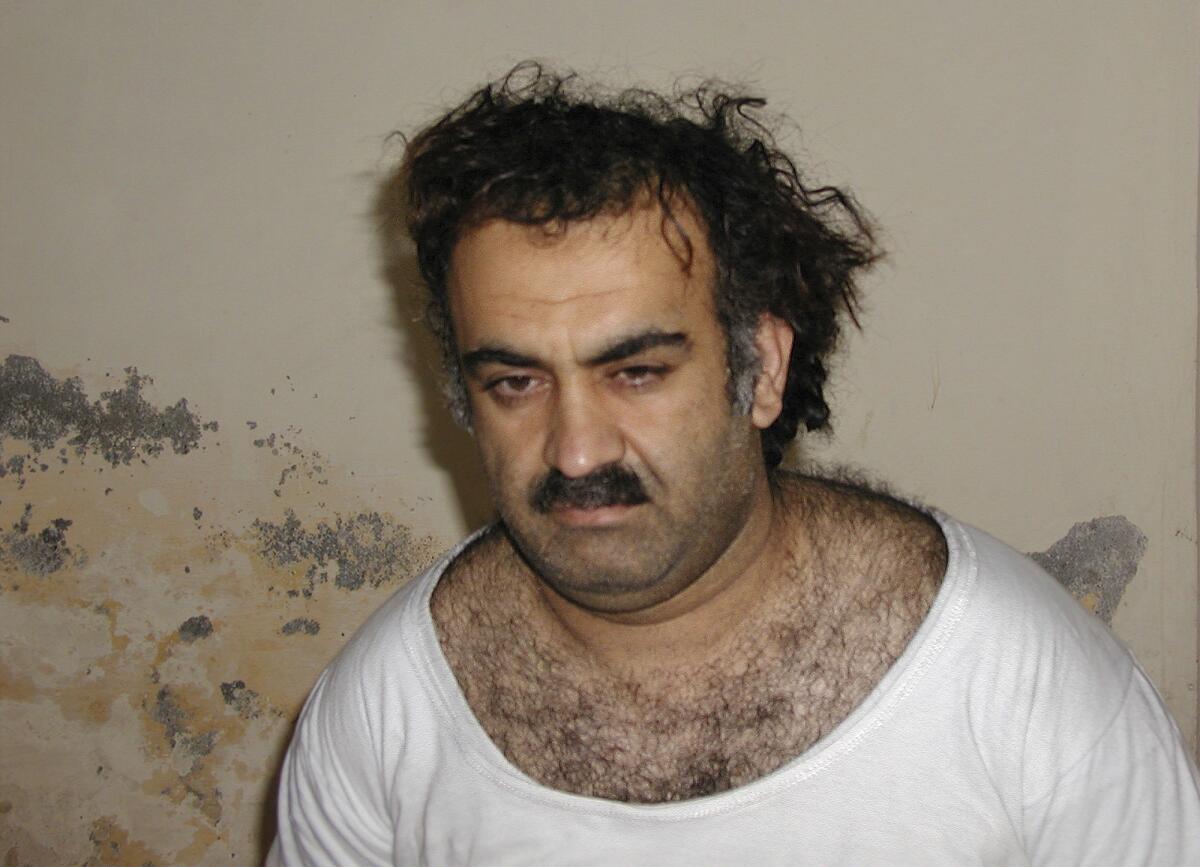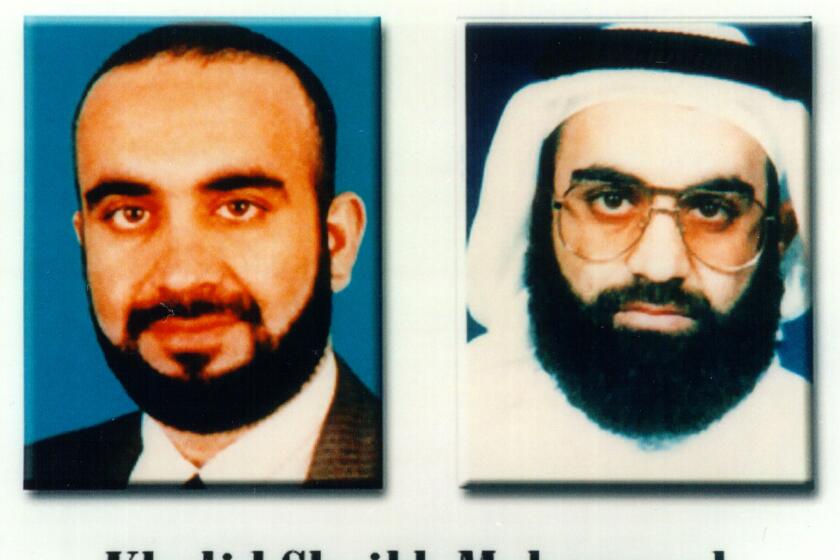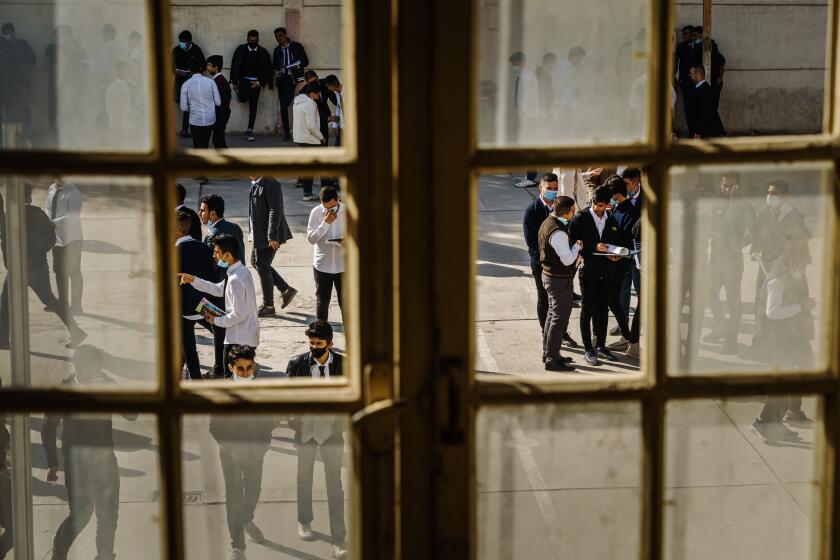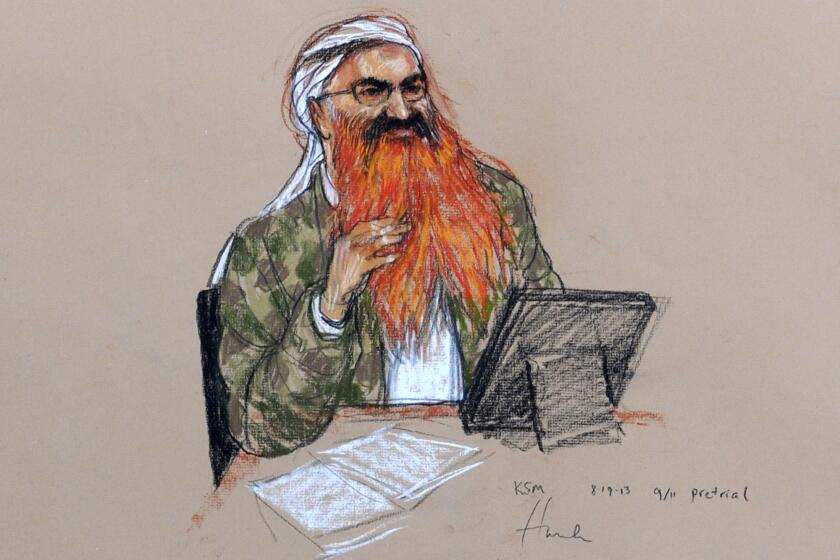Plea negotiations could mean no 9/11 defendants face the death penalty, U.S. tells families

- Share via
WASHINGTON — The suspected architect of the Sept. 11, 2001, attacks and his fellow defendants may never face the death penalty under plea agreements now under consideration to bring an end to their more than decadelong prosecution, the Pentagon and FBI have advised families of some of the thousands killed.
The notice, made in a letter that was sent to several of the families and obtained by the Associated Press, comes 1½ years after military prosecutors and defense lawyers began exploring a negotiated resolution to the case.
The prosecution of Khalid Shaikh Mohammed and four others held at the U.S. detention center in Guantanamo Bay, Cuba, has been troubled by repeated delays and legal disputes, especially over the legal ramifications of the interrogation under torture that the men underwent in CIA custody. No trial date has been set.
“The Office of the Chief Prosecutor has been negotiating and is considering entering into pre-trial agreements,” or PTAs, the letter said. It told the families that while no plea agreement “has been finalized, and may never be finalized, it is possible that a PTA in this case would remove the possibility of the death penalty.”
Journalist Terry McDermott has spent the better part of two decades chasing Khalid Shaikh Mohammed, the self-professed mastermind of the Sept. 11 attacks. What drives him, and what has he learned?
Some relatives of the nearly 3,000 people killed outright in the terrorist attacks expressed outrage over the prospect of ending the case short of a verdict. The military prosecutors pledged to present their views to the military authorities who would make the final decision on accepting a plea agreement.
The letter, dated Aug. 1, was received by some family members only this week. It asks them to respond by Monday to the FBI’s victim services division with any comments or questions about the possibility of such a plea agreement. The FBI had no comment Wednesday on the letter.
On Sept. 11, 2001, conspirators from the Al Qaeda militant group seized control of jets to use them as passenger-filled missiles, hitting New York’s World Trade Center and the Pentagon near Washington. A fourth plane was headed for Washington but crashed in Pennsylvania after crew members and passengers tried to storm the cockpit.
Mohammed presented the idea of such an attack to Al Qaeda leader Osama bin Laden and received authorization to craft what became the 9/11 attacks, the United States’ 9/11 Commission concluded. The four other defendants are alleged to have supported the hijackers in various ways.
The attacks led to the U.S. “war on terror,” which included invasions and prolonged wars in Afghanistan, where Al Qaeda was based, and in Iraq, which had no connection with the attacks.
For much of the world, Iraq is a distant tragedy. But for its children raised amid chaos and war, that legacy has defined their generation.
Jim Riches, who lost his firefighter son Jimmy in 9/11, went to Guantanamo for pretrial hearings in 2009. He said he laughed bitterly when he opened the government’s letter Monday. “How can you have any faith in it?” Riches asked. The update “gives us a little hope,” he said, but justice still seems far off.
Riches, a retired deputy fire chief in New York City, said he initially was open to the use of military tribunals but now feels the 9/11 defendants should be tried in civilian court.
The coming trial of Khalid Shaikh Mohammed before a military commission will focus not on what he did — orchestrate the deaths of 2,973 people — but on the torture inflicted on him as a result.
The Obama administration at one point sought to do so, but the idea was shelved because of opposition from some victims’ relatives and members of Congress and city officials’ concerns about security costs.
Other family members — part of a network of 9/11 families that has pushed for answers and accountability over the years — said they would insist that any plea agreement allow their lawyers to question the defendants on the extent of any Saudi official involvement in 9/11. Saudi Arabia denies involvement by senior Saudi officials.
The 9/11 hearings have been on hold while military officials examine whether one of the defendants is competent to stand trial. Hearings are set to resume Sept. 18.
The five defendants were captured at various times and places in 2002 and 2003 and sent to Guantanamo for trial in 2006. The hearings have been mired in litigation over how much testimony should be considered inadmissible due to the torture that defendants underwent in early CIA custody, including the waterboarding of Mohammed 183 times.
Knickmeyer reported from Washington, Peltz from New York.
More to Read
Sign up for Essential California
The most important California stories and recommendations in your inbox every morning.
You may occasionally receive promotional content from the Los Angeles Times.
















